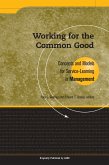Some rather remarkable changes took place in North American business schools between 1945 and 1970, altering the character of these institutions, the possibilities for their future, and the terms of discourse about them. This period represents a minor revolution, during which business school are reported to have become more academic, more analytic, and more quantitative.
The Roots, Rituals, and Rhetorics of Change considers these changes and explores their roots. It traces the origins of this quiet revolution and shows how it shaped discussions about management education, leading to a shift in that weakened the place of business cases and experiential knowledge and strengthened support for a concept of professionalism that applied to management.
The text considers how the rhetoric of change was organized around three core questions: Should business schools concern themselves primarily with experiential knowledge or with academic knowledge? What vision of managers and management should be reflected by business schools? How should managerial education connect its teaching to some version of reality?
The Roots, Rituals, and Rhetorics of Change considers these changes and explores their roots. It traces the origins of this quiet revolution and shows how it shaped discussions about management education, leading to a shift in that weakened the place of business cases and experiential knowledge and strengthened support for a concept of professionalism that applied to management.
The text considers how the rhetoric of change was organized around three core questions: Should business schools concern themselves primarily with experiential knowledge or with academic knowledge? What vision of managers and management should be reflected by business schools? How should managerial education connect its teaching to some version of reality?
Dieser Download kann aus rechtlichen Gründen nur mit Rechnungsadresse in A, D ausgeliefert werden.









